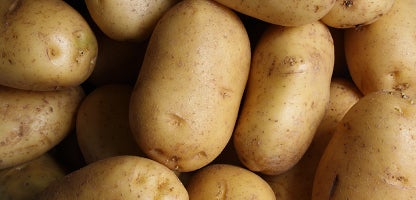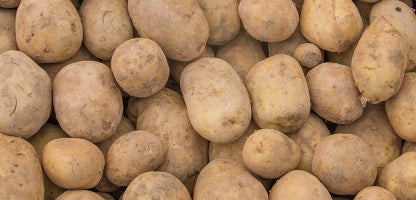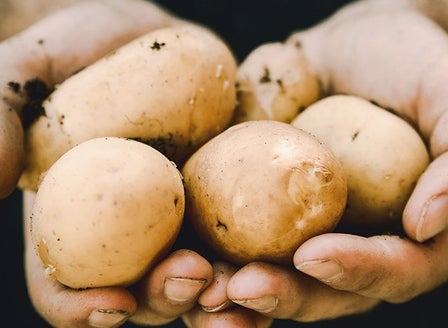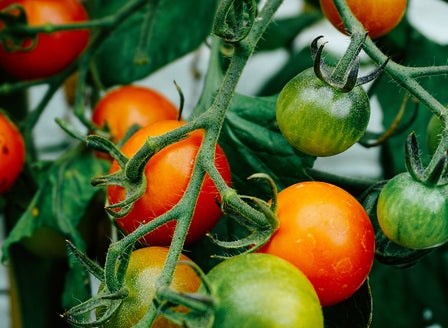The humble potato is staple vegetable that is used in many New Zealand dishes and is extremely versatile. Plant early season varieties in September to enjoy home-grown potatoes for Christmas.
Planting Calendar
Potatoes can be planted from July until February, depending on the type and variety of potato.
Harvest In
60 - 150 Days
Potatoes are classified into two main crops, early and main. Early varieties are ready to harvest when the flowers are fully open, usually around 3 months after planting. Main crop varieties are ready when the foliage dies off all together, which is often twice that of long as early croppers. Using a garden fork carefully lift your Potatoes from the ground. If the skin can easily be rubbed off, then although they may be ready to eat, they are not ready if you are wanting to store them. If so, leave them for a little longer in the ground while the skins cure. They can be stored in a cool, dark place, just make sure they are dry, and they can last up to six months.
Prepare
As soon as you purchase your seed potatoes, place them in a warm spot for up to four weeks until their ‘eyes’ have produced 20mm sprouts, which is also known as ‘chitting’.
Position
Potatoes need plenty of sunlight and a free draining soil to grow effectively.
Soil
When planted into the ground Potatoes like a deep free draining soil that is rich in organic matter. To improve the organic content in your soil, break up the soil and add Kings Compost and Kings Sheep Pellets then mix together well. Before planting your potatoes add a 20cm layer of Living Earth Organic Veggie mix to plant your potatoes into. When growing in containers, plant into Living Earth Organic Veggie Mix.
Plant
When planting, work lots of Kings Organic Compost and Kings Potato Food into your soil – the richer the soil the bigger the crop will be. Plant Kings Seed Potatoes at 30cm apart in 5cm deep trenches, with each trench being 60cm apart. Cover the trenches with soil and as sprouts emerge, mound extra soil up around the stems as they grow. Do this mounding several times until at least 30cm of soil has been added, as this will encourage more tubers to form up the stems.
Care
Watering
Plants need to be kept well watered for the development of good potatoes, especially when the plant is flowering. Deeply water each plant individually, as this is more beneficial than a light watering with a sprinkler.
Feeding
Potatoes are heavy feeders, so apply an application of Kings Potato Food once every six weeks as the tubers are developing.
Protecting
Crop rotation is important as growing potatoes (and other vegetables) in the same place year after year can cause a build up of soil insect pests and a lack in key nutrients. Protect against slugs and snails with Tui quash.
Spraying
If weather conditions are wet and humid then preventative spraying with a fungicide such as FreeFlo Copper is advisable to keep blight at bay. Spray with Success Ultra to keep Potato Psyllid under control.
General Care
When using sprays, chemicals or fertilisers always read the label and follow the instructions. Apply sprays in the evening to avoid harming beneficial insects.
Expert Tip
Crop rotation is the technique of planting crops in a different area of the garden so that no single crop will be planted in the same place two—or more—years in a row.
Tip
If space is an issue in your veggie garden, or even if you want to give potatoes a try on your deck or balcony, potatoes can be grown in pots or bags, specifically designed to grow Potatoes. Plant in Organic Veggie Mix and be sure to feed and water well during hot periods.
Top Varieties

Early Crop
Early Crop varieties include Rocket, Cliff Kidney, Jersey Bennes.

Main Crop
Main Crop varieties include Agria, Desiree, Nadine, Rua and can take up to 100-140 days to mature.

Late Crop
Late Crop varieties include Moonlight and Desire.
Second Early
Second Early crops takes up to 80-140 days to mature. These include Allura, Ilham Hardy, Karaka
Frequently Asked Questions
Why are my potatoes flavourless and watery?
This is caused by potato psyllid. You need to prevent potato psyllid from attacking your plants, otherwise their taste and texture will change. Spraying with Success Ultra will keep these pests at bay.
Why are my potatoes turning green?
Potato tubers turn green when they are exposed to light. Keep mounding up your plants as they grow to keep the tubers covered with soil. Harvested potatoes should be stored in a cool, dark, dry location. Green Potatoes are toxic and can make you sick if consumed in large quantities.
How often should I water my potato plants?
Plants need to be kept well watered for the development of good potatoes, especially when the plant is flowering. Deeply water each plant individually, as this is more beneficial than a light watering with a sprinkler.
When and how should I harvest my potatoes?
Potatoes are classified into two main crops, early and main. Early varieties are ready to harvest when the flowers are fully open, usually around 3 months after planting. Main crop varieties are ready when the foliage dies off all together, which is often twice that of long as early croppers. Using a garden fork carefully lift your Potatoes from the ground. If the skin can easily be rubbed off, then although they may be ready to eat, they are not ready if you are wanting to store them. If so, leave them for a little longer in the ground while the skins cure. They can be stored in a cool, dark place, just make sure they are dry, and they can last up to six months.
Can I grow potatoes in containers, and how?
Yes, potatoes can be grown in containers. Use a large pot or grow bag with good drainage. Fill the container with 10-15 cm of soil, plant the seed potatoes, and cover with more soil as they grow. Water regularly and ensure the container gets plenty of sunlight.


